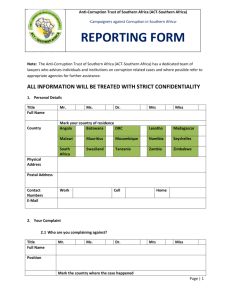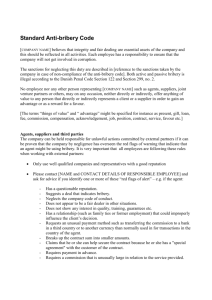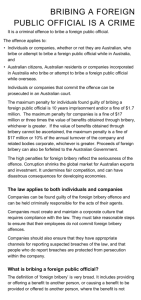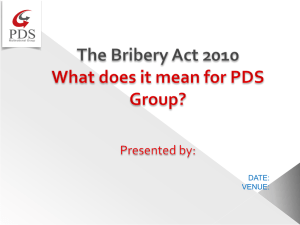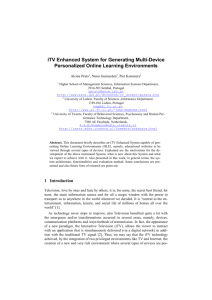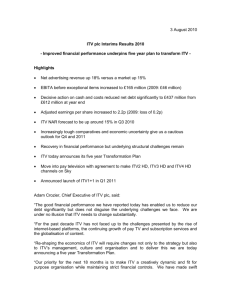Anti-corruption and bribery policy
advertisement
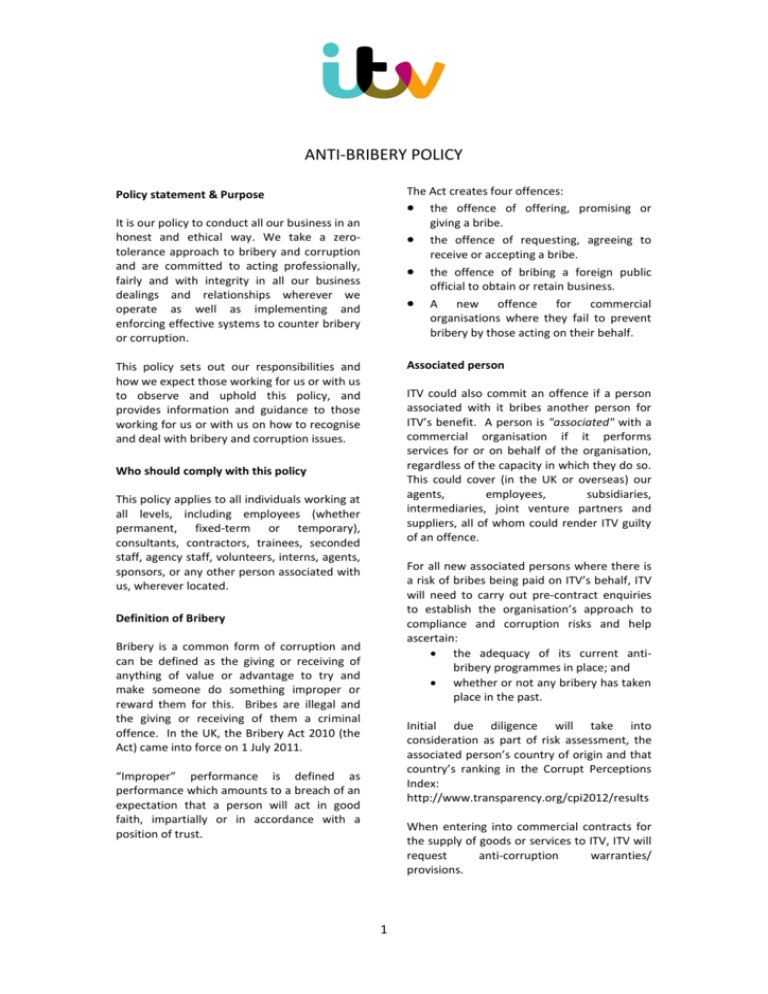
ANTI-BRIBERY POLICY The Act creates four offences: the offence of offering, promising or giving a bribe. the offence of requesting, agreeing to receive or accepting a bribe. the offence of bribing a foreign public official to obtain or retain business. A new offence for commercial organisations where they fail to prevent bribery by those acting on their behalf. Policy statement & Purpose It is our policy to conduct all our business in an honest and ethical way. We take a zerotolerance approach to bribery and corruption and are committed to acting professionally, fairly and with integrity in all our business dealings and relationships wherever we operate as well as implementing and enforcing effective systems to counter bribery or corruption. Associated person This policy sets out our responsibilities and how we expect those working for us or with us to observe and uphold this policy, and provides information and guidance to those working for us or with us on how to recognise and deal with bribery and corruption issues. ITV could also commit an offence if a person associated with it bribes another person for ITV’s benefit. A person is "associated" with a commercial organisation if it performs services for or on behalf of the organisation, regardless of the capacity in which they do so. This could cover (in the UK or overseas) our agents, employees, subsidiaries, intermediaries, joint venture partners and suppliers, all of whom could render ITV guilty of an offence. Who should comply with this policy This policy applies to all individuals working at all levels, including employees (whether permanent, fixed-term or temporary), consultants, contractors, trainees, seconded staff, agency staff, volunteers, interns, agents, sponsors, or any other person associated with us, wherever located. For all new associated persons where there is a risk of bribes being paid on ITV’s behalf, ITV will need to carry out pre-contract enquiries to establish the organisation’s approach to compliance and corruption risks and help ascertain: the adequacy of its current antibribery programmes in place; and whether or not any bribery has taken place in the past. Definition of Bribery Bribery is a common form of corruption and can be defined as the giving or receiving of anything of value or advantage to try and make someone do something improper or reward them for this. Bribes are illegal and the giving or receiving of them a criminal offence. In the UK, the Bribery Act 2010 (the Act) came into force on 1 July 2011. Initial due diligence will take into consideration as part of risk assessment, the associated person’s country of origin and that country’s ranking in the Corrupt Perceptions Index: http://www.transparency.org/cpi2012/results “Improper” performance is defined as performance which amounts to a breach of an expectation that a person will act in good faith, impartially or in accordance with a position of trust. When entering into commercial contracts for the supply of goods or services to ITV, ITV will request anti-corruption warranties/ provisions. 1 Sanctions for non-compliance The potential consequences of being convicted of a bribery offence include criminal penalties for both individuals and companies: Individuals can be jailed for up to ten years and/or receive an unlimited fine. Companies can receive unlimited fines. "Senior officers" (which is broadly defined, and includes directors) can also be convicted of an offence where they are deemed to have given their consent to giving or receiving a bribe or bribing a foreign public official. Importantly, it is possible that omitting to act might be regarded as consent and lead to prosecutions, fines and/or imprisonment. for small gifts to be given at Christmas time; taking into account the reason for the gift, it is of an appropriate type and value and given at an appropriate time. For example, receiving a gift from a supplier at the time that we are conducting a review process or re-tendering is not appropriate; it is given openly, not secretly; and/or it is not offered to, or accepted from, government officials or representatives, or politicians or political parties. Facilitation payments Our policy is that we will not make, and will not accept, facilitation payments of any kind. Facilitation payments are typically small, unofficial payments made to secure or speed up a routine government action by a government official. They are not commonly paid in the UK, but are common in some other jurisdictions in which we operate. If you are asked to make a payment on our behalf, you should always be mindful of what the payment is for and whether the amount requested is proportionate to the goods or services provided. You should always ask for a receipt which details the reason for the payment. Gifts and hospitality This policy does not prohibit normal and appropriate hospitality (given and received) to or from third parties. We appreciate that the practice of giving business gifts varies between countries and regions and what may be normal and acceptable in one region may not be in another. The test to be applied is whether in all the circumstances the gift or hospitality is reasonable and justifiable and not linked in any way to an improper act. The intention behind the gift should always be considered. Donations The giving or receipt of gifts should be acceptable, if the following requirements are met: it is not made with the intention of influencing ITV or a third party to obtain or retain business or a business advantage, or to reward the provision or retention of business or a business advantage, or in explicit or implicit exchange for favours or benefits; the gift is given in ITV’s name, not in your name; it does not include cash; it is appropriate in the circumstances. For example, in the UK it is customary It is ITV’s policy not to make cash donations or any other donations to political parties. We do, however, ensure our views are expressed to governments in an appropriate and effective manner on matters that affect our business through our Public Affairs department. A vital part of ITV’s reputation as a leading broadcaster and producer is our impartiality and freedom from bias. We therefore ensure that our dealings with governments, political parties and political candidates are not perceived as favouring one group or cause above any other. We only make charitable donations that are legal and ethical under local laws and practices. 2 Lobbying Monitoring and review You should seek the assistance of ITV’s Public Affairs and/or Regulatory Affairs departments, which are responsible for the day-to-day coordination of contact with government departments and agencies, before attempting to engage in any lobbying in relation to any regulatory matter in relation to any ITV’s business. We will monitor the effectiveness and review the implementation of this policy, regularly considering its suitability, adequacy and effectiveness. Any improvements identified will be made as soon as possible. ITV may request any associated party to confirm compliance with this anti-bribery policy on an annual basis. Internal control systems and procedures will be subject to regular audits to provide assurance that they are effective in countering bribery and corruption. Your responsibilities You must ensure that you read, understand and comply with this policy. The prevention, detection and reporting of bribery and other forms of corruption are the responsibility of all those working for us, with us or under our control. All workers are required to avoid any activity that might lead to, or suggest, a breach of this policy. Questions If you are unsure whether a particular act constitutes bribery or corruption, or if you have any other queries relating to this policy, please feel free to discuss with any member of the ITV Legal team. You must notify ITV as soon as possible if you believe or suspect that a conflict with or breach of this policy has occurred, or may occur in the future. We reserve our right to terminate our contractual relationship with any third parties if they breach this policy. Record-keeping We must keep financial records and have appropriate internal controls in place which will evidence the business reason for making payments to third parties. All accounts, invoices, memoranda and other documents and records relating to dealings with ITV should be prepared and maintained with strict accuracy and completeness. Training and communication Our zero-tolerance approach to bribery and corruption must be communicated to all suppliers, contractors and business partners at the outset of our business relationship with them and as appropriate thereafter. 3


